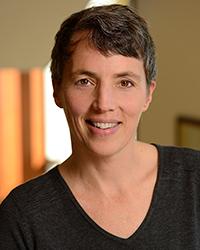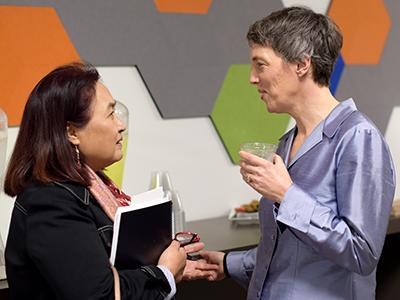Sarah Szanton, PhD, RN, ANP, FAAN, and a professor at the Johns Hopkins School of Nursing in Baltimore, Maryland, was this year’s Blanton Lectureship presenter and shared fascinating information on helping improve quality of life for older adults. Her intervention, Community Aging in Place – Advancing Better Living for Elders (CAPABLE), takes a multidisciplinary team approach to equipping low-income older adults to live more comfortably and safely in their homes by letting patients set their own functional goals, such as taking a bath or walking to church, while also improving their living environment though renovations, such as installing hand rails or lowering shelves.

In a recent interview, Dr. Szanton discussed the intervention CAPABLE and how it helps older adults “age in place.” In it, she described her first job after nursing school when she worked with migrant farmworkers, learning a lot about the social determinants of health. “Even though my patients were young men all doing the same job, they were very different in terms of health,” she said.
After returning to school to become a nurse practitioner, she started doing house calls for low-income older adults who found it difficult or impossible to come to clinic visits. Based on her experience doing that, she decided to get a PhD in order to develop research that would address the health disparities that many older people in this country face.
Afterwards, she developed CAPABLE, a truly interprofessional model involving occupational therapists, nurses, and even handymen. The intervention not only depends on experts to address a variety of medical issues, it uses home repair and regular household items to improve people’s functions and decrease their health care costs. Someone may want to sleep in their own bed, for example, instead of on the couch, but is unable to do so because of muscle weakness, shaky banisters or crooked stairs. It often takes a team to address all of those issues to help older adults meet their goals, Dr. Szanton explained.

“Nurses and occupational therapists use their expertise to support the goal-development brainstorming for older adult participants,” she said. “However, the participants themselves drive the goals and achievements of the program.”
As a nurse making house calls in Baltimore, she saw patients who were unable to walk and had to crawl to the front door to let her in. She realized that hiring carpenters and adding nursing visits could be a good fit.
For instance, one participant she had was very frail and sat on a commode chair all day. When reviewing her medication list, the nurse found that the patient was taking 26 medications. Too many of them were for pain, which was why she was dazed and unable to move around. After medication adjustments, the nurse helped the family make a medication chart that was clearer. Not long after, the participant became more alert and was able to set her own goals. One of her goals was to be able to go downstairs. When she began the program, it took her 30 minutes to walk down the hall to reach the bathroom. By the end of the four months, she was able to get herself out of bed. The first time this happened, her husband burst into tears.
“A very important thing for nurses working with older adults is to treat each one as an individual with goals and resilient potential, even up until their last weeks of life,” she said.
Dr. Szanton is associate director for policy at the Center for Innovative Care in Aging at Johns Hopkins as well as core faculty at the Center on Aging and Health, the Hopkins Center for Health Disparities Solutions and adjunct faculty with the Hopkins Center for Injury Research and Policy. CAPABLE is now available in 17 locations across nine states. Dr Szanton was recently named an American Academy of Nursing (AAN) Edge Runner for her work as the program’s principal investigator.